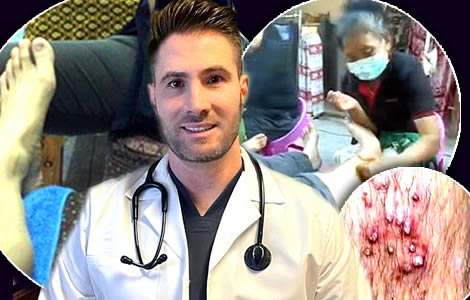A $5 back-alley massage in Thailand left a tourist with painful, pus-filled folliculitis caused by bacteria from dirty towels and reused oils. US doctor warns travellers to avoid cheap, unhygienic massages, saying, “When the massage is $5, the infection is free.”
A U.S. doctor has gone viral after slamming a dodgy Thai massage that left a tourist covered in pus-filled sores. The ER physician identified the infection as folliculitis—a nasty rash caused by bacteria invading hair follicles. His verdict? Filthy towels, reused oils and zero hygiene. What was meant to be a relaxing $5 massage turned into a painful medical nightmare.

A U.S. doctor has issued a strong warning to travellers visiting Thailand. The warning comes after a tourist developed a severe skin infection from a cheap Thai massage. Dr. Joe Whittington, an emergency room physician, responded to a viral TikTok video posted by a concerned woman.
The video showed her boyfriend’s legs covered in red, pus-filled bumps after a $5 massage in Thailand. He received the massage from an elderly woman working in a backstreet alleyway.
At first, the experience seemed harmless. However, things took a terrifying turn the next morning. The man woke up to find his legs inflamed with painful, unsightly lesions.
Doctor identifies painful bumps as folliculitis, likely caused by staph bacteria from unclean massage supplies
According to Dr. Whittington, the man had developed folliculitis—an infection of the hair follicles. This condition often results in red, itchy or pus-filled pimples on the skin.
“Folliculitis happens when bacteria and bad decisions team up,” Dr. Whittington said in his viral reaction.
He explained that the infection was most likely caused by Staphylococcus aureus, commonly referred to as staph bacteria. This bacterium can spread through direct skin contact or contaminated items such as towels or oils.
Furthermore, Dr. Whittington warned that unsanitary massage conditions can turn minor contact into a medical issue.
“What you see here is folliculitis,” he explained. “Your immune system goes, ‘What in the unsanitary hell was that?’” The video showed the massage worker wearing a face mask during the session.
Despite wearing a mask, the massage worker’s bare hands posed greater health risks, according to physician
However, Dr. Whittington pointed out that the woman’s bare hands posed a greater risk than her uncovered mouth.
“She’s masked up while rubbing you down with her biohazard hands,” he said. Importantly, he emphasised the role of hygiene in preventing these infections.
“This happens when dirty hands, reused oils or uncleaned towels introduce bacteria into your skin,” he warned.
Sweaty skin, open pores, and low sanitation create the perfect storm for infection. Therefore, Dr. Whittington urged travellers to avoid massage setups that appear unsafe or poorly maintained.
“So if your massage table is made of concrete and there’s a moped parked next to it,” he said.
“Maybe just stretch and call it a day, bro.”
His humorous tone belied the seriousness of the risk. The infection, while treatable, can cause significant pain and discomfort. Simple cases may improve with soap, water and time.
Infections like folliculitis can worsen and require antibiotics if not treated properly after exposure abroad
However, some infections require antibiotics or further medical treatment. According to the ER doctor, it’s better to prevent exposure than to rely on a cure.
His video quickly went viral, gaining over 365,000 views and prompting a wave of concerned comments. Many viewers expressed shock and hesitation toward getting massages while travelling in Thailand.
One person wrote, “Oh no! That is scary.”
Another added, “Yikes! Um, no thanks.”
The story also drew attention from professionals in the massage industry. A licensed massage therapist commented on the video, highlighting the lack of global regulation.
“This isn’t just in Thailand,” the therapist said. “It can happen anywhere. There aren’t rules when someone sets up shop without training.”
Unregulated massage businesses without licenses or sanitation pose a serious health risk to travellers
Unregulated practitioners can operate without adhering to hygiene protocols, certifications or proper facilities. This lack of oversight increases the risk of infection, injury or worse.
As a result, travellers are now being urged to choose massage services wisely. Researching providers, reading reviews and checking for licenses can reduce health risks abroad.
Some travellers shared their positive experiences to highlight the difference between professional and street-side services.
“As someone who just came back from Thailand and had five massages in proper spas,” one user wrote. “I can unequivocally say they were amazing.”
Another added, “I got a massage every day I was in Thailand—at actual massage places. Literally the best massages I’ve ever had.”
Thailand is famous for its traditional massage techniques and wellness culture. Yet, Dr. Whittington’s warning makes it clear: not all massage experiences are created equal.
Cheap street massages may be tempting, but can expose tourists to hidden bacterial dangers and infections
Low-cost street massages may offer quick relief but could carry hidden dangers.
Folliculitis is not life-threatening, but untreated cases can lead to worse infections. Moreover, staph infections can sometimes spread beyond the skin. In rare cases, they can enter the bloodstream or cause abscesses.
Therefore, choosing a clean, professional environment is not just about comfort—it’s a matter of health. Even if the service seems cheap, the long-term cost can be much higher.
Shock death of a 20-year-old budding singer in Udon Thani linked to Thai traditional massage visits
Health Minister rejects claims Luk Thung singer died from massage shop injuries. She had meningitis
Tourists are advised to watch for red flags: dirty towels, reused massage oils or therapists not washing hands between clients.
If a massage setup looks improvised or unsanitary, it’s best to walk away. Undoubtedly, while Thailand offers world-renowned massage therapy, caution is essential.
As Dr. Whittington put it, “When the massage is $5 and the infection is free, it’s not worth it.” Travellers should enjoy local experiences—but never at the cost of their health.
Join the Thai News forum, follow Thai Examiner on Facebook here
Receive all our stories as they come out on Telegram here
Follow Thai Examiner here
Further reading:
Health Minister rejects claims Luk Thung singer died from massage shop injuries. She had meningitis
Shock death of a 20-year-old budding singer in Udon Thani linked to Thai traditional massage visits
Budding Thai tourism entrepreneur to be deported after being arrested for working without a permit


















